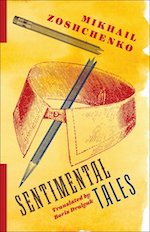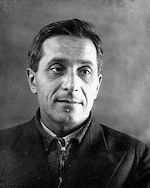 The Book Beat reading group selection for September is Sentimental Tales by Mikhail Zoshchenko, translated by Boris Dralyuk. Our discussion will be held Wednesday, September 27 at 7:00 PM online via Zoom. A Zoom link will be sent on the afternoon of the meeting to anyone interested in attending. Email bookbeatorders@gmail.com to sign up. Books are in stock now and discounted 15%. Please call (248) 968-1190 for more information.
The Book Beat reading group selection for September is Sentimental Tales by Mikhail Zoshchenko, translated by Boris Dralyuk. Our discussion will be held Wednesday, September 27 at 7:00 PM online via Zoom. A Zoom link will be sent on the afternoon of the meeting to anyone interested in attending. Email bookbeatorders@gmail.com to sign up. Books are in stock now and discounted 15%. Please call (248) 968-1190 for more information.
Mikhail Zoshchenko’s Sentimental Tales are satirical portraits of small-town characters on the fringes of Soviet society in the first decade of Bolshevik rule. The tales are narrated by one Kolenkorov, who is anything but a model Soviet author: not only is he still attached to the era of the old regime, he is also, quite simply, not a very good writer. Shaped by Zoshchenko’s masterful hands–he takes credit for editing the tales in a series of comic prefaces–Kolenkorov’s prose is beautifully mangled, full of stylistic infelicities, overloaded flights of metaphor, tortured cliché, and misused bureaucratese, in the tradition of Gogol.
Yet beneath Kolenkorov’s intrusive narration and sublime blathering, the stories are genuinely moving. They tell tales of unrequited love and amorous misadventures among down-on-their-luck musicians, provincial damsels, aspiring poets, and liberal aristocrats hopelessly out of place in the new Russia, against a backdrop of overcrowded apartments, scheming, and daydreaming. Zoshchenko’s deadpan style and sly ventriloquy mask a biting critique of Soviet life–and perhaps life in general. An original perspective on Soviet society in the 1920s and simply uproariously funny, Sentimental Tales at last shows Anglophone readers why Zoshchenko is considered among the greatest humorists of the Soviet era.
“Zoshchenko knew, of course, that his stories were funny, but they were never frivolous. Their humor was rooted in real life, with all its horrors. Truly great humorists are never blind to the horrors of life; they see them clearly, but transform them, for our benefit—and often at great personal cost—into a laughing matter. This makes the terrible truth bearable, not invisible. It is necessary work, for which we ought to be grateful.” –from a post by Zoshchenko’s translator Boris Dralyuk.
I know of no satirist more angry, more warlike than Mikhail Zoshchenko. Yet I love him not for his anger, I love him for his astonishing irony–for the fact that it is sometimes difficult to determine the target of his mockery: is it his characters, his readers, himself? This new translation preserves Zoshchenko’s irony in all its force. –Andrey Kurkov, author of Death and the Penguin
The only thing harder than cracking jokes may be translating them. Perhaps this is why Mikhail Zoshchenko remains a lesser-known Russian writer among English-language readers, despite being one of the Soviet Union’s most beloved humorists, a satirist in the best traditions of Gogol. Boris Dralyuk’s new translation of Sentimental Tales, a collection of Zoshchenko’s stories from the 1920s, is a delight that brings the author’s wit to life. –The Economist
Dralyuk’s renderings provide worthy updates, largely successful in employing different registers to capture Zoshchenko’s sparkling hodge-podge of colloquialisms and formal locutions. –Rain Taxi Review of Books
 Mikhail Zoshchenko (1894-1958) was a leading Soviet satirist. He was born in Poltava, Ukraine, on 1895. He studied law at the University of Petersburg but did not graduate. During the First World War Zoshchenko served in the Russian Army. A supporter of the October Revolution, Zoshchenko joined the Red Army and fought against the Whites in the Civil War. In 1922, Zoshchenko joined “The Serapion Brothers,” a literary group which its activity was inspired by the work of Yevgeni Zamyatin. The group took its name from the story by E.T.A. Hoffmann by the same name, which describes an individualist who vows to devote himself to free, imaginative, and nonconformist art. Zoshchenko’s early stories deal with his experiences in the First World War and the Russian Civil War. He gradually developed a new style that relied heavily on humor. Zoshchenko’s works of satire were popular with the Russian people and he was one of the country’s most widely read writers in the 1920s In 1946 he was expelled from the Soviet Writers’ Union. He never recovered from this trauma and died of heart failure in 1958. Zoshchenko’s biography is taken from the Short Story Project. ] Boris Dralyuk is the editor of 1917: Stories and Poems from the Russian Revolution (2016) and coeditor of The Penguin Book of Russian Poetry (2015).
Mikhail Zoshchenko (1894-1958) was a leading Soviet satirist. He was born in Poltava, Ukraine, on 1895. He studied law at the University of Petersburg but did not graduate. During the First World War Zoshchenko served in the Russian Army. A supporter of the October Revolution, Zoshchenko joined the Red Army and fought against the Whites in the Civil War. In 1922, Zoshchenko joined “The Serapion Brothers,” a literary group which its activity was inspired by the work of Yevgeni Zamyatin. The group took its name from the story by E.T.A. Hoffmann by the same name, which describes an individualist who vows to devote himself to free, imaginative, and nonconformist art. Zoshchenko’s early stories deal with his experiences in the First World War and the Russian Civil War. He gradually developed a new style that relied heavily on humor. Zoshchenko’s works of satire were popular with the Russian people and he was one of the country’s most widely read writers in the 1920s In 1946 he was expelled from the Soviet Writers’ Union. He never recovered from this trauma and died of heart failure in 1958. Zoshchenko’s biography is taken from the Short Story Project. ] Boris Dralyuk is the editor of 1917: Stories and Poems from the Russian Revolution (2016) and coeditor of The Penguin Book of Russian Poetry (2015).
